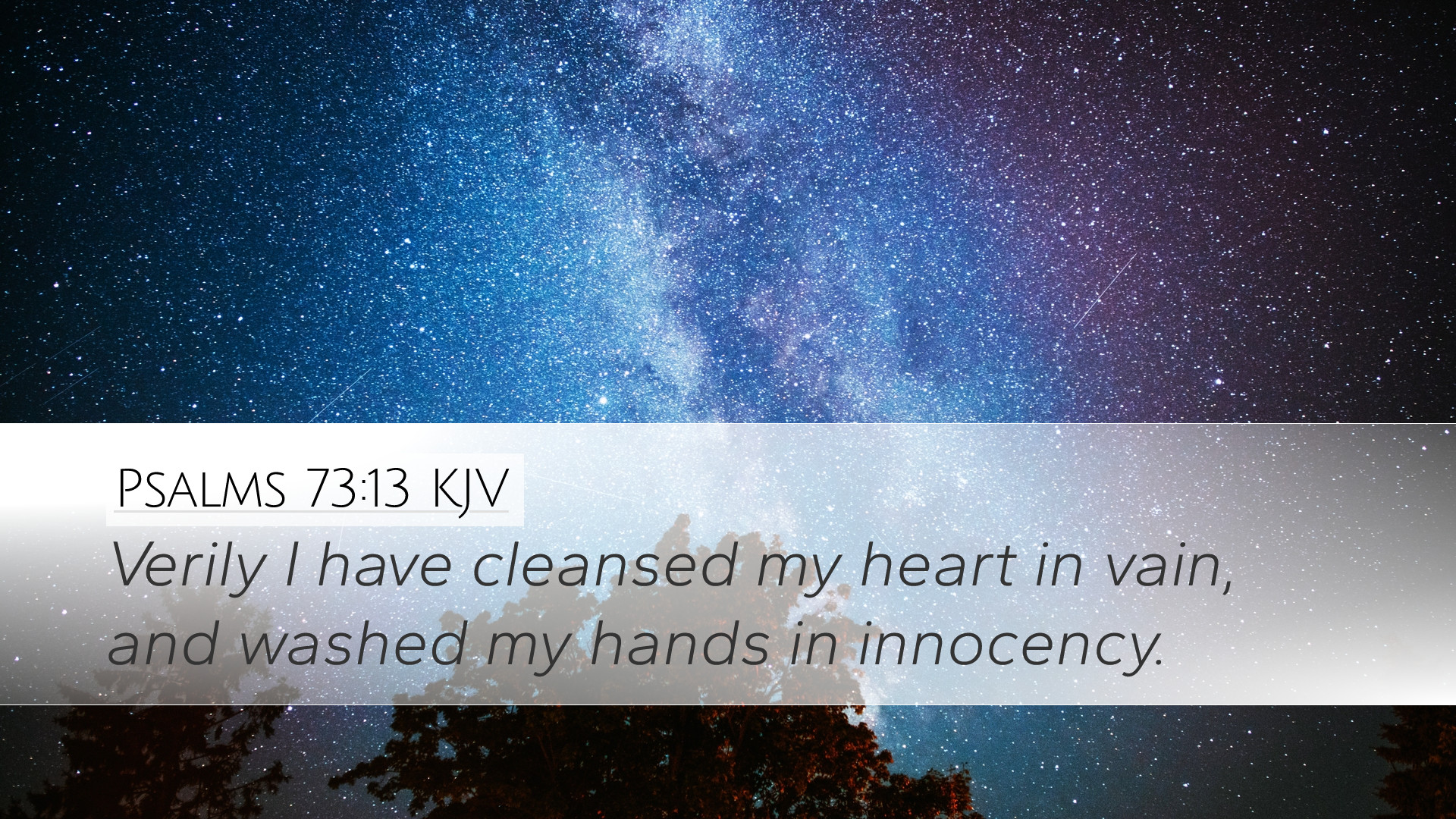Commentary on Psalms 73:13
Verse: "Verily I have cleansed my heart in vain, and washed my hands in innocency." - Psalms 73:13
Introduction
The 73rd Psalm serves as a poignant reflection of a believer's struggle with faith and doubt in the face of apparent injustice. The verse under consideration encapsulates a moment of despair experienced by Asaph, the psalmist, who grapples with the seeming futility of maintaining righteousness while witnessing the prosperity of the wicked. This commentary synthesizes insights from renowned public domain scholars, offering a rich understanding of the text.
Context and Literary Analysis
Asaph begins Psalm 73 with a declaration of God's goodness to Israel, leading to a deep personal conflict as he observes the wellbeing of the wicked. The psalmist's reflections reflect themes of faith, doubt, and the ultimate fate of the righteous versus the wicked.
Historical Context
In the time of Asaph, Israel was often embroiled in spiritual conflicts, negotiating their faith in Yahweh amidst surrounding nations that pursued prosperity through unrighteous means. The contrast between the wicked flourishing and the righteous suffering is a timeless struggle that resonates with believers across generations.
Form and Structure
Psalm 73 employs a personal voice and introspective language, allowing readers to engage deeply with the emotional and spiritual turmoil felt by the psalmist. The verse sits at a pivotal moment in the psalm, highlighting a turning point in Asaph's understanding of God's justice.
Exegesis of Psalms 73:13
Analysis of the Text: Asaph's lament, "Verily I have cleansed my heart in vain," speaks profoundly to the internal conflict between belief and the observable world. He feels a disillusionment with his efforts to remain pure and righteous, suggesting a desperation that can arise when one's faith appears to yield no tangible rewards.
Matthew Henry's Perspective
Matthew Henry observes that Asaph's statement reflects a deep sense of disappointment with the seeming ineffectiveness of his moral and spiritual pursuits. Henry highlights that the word "verily" emphasizes the gravity of Asaph's admission—he feels certain that his efforts have resulted in nothing significant. This sentiment illustrates the dangers of comparing one’s spiritual journey with the success of others, particularly those who reject divine precepts.
Albert Barnes' Interpretation
Albert Barnes interprets this verse as a candid confession of Asaph's struggle. He points out that the psalmist believed he had engaged in holiness and integrity in a sincere effort to please God, only to find himself feeling empty and futile in his endeavors. Barnes underscores the irony that pursuing righteousness led him to a place of despair when juxtaposed with the prosperity enjoyed by those living in disobedience to God’s laws.
Adam Clarke's Insights
Adam Clarke expands on this theme by noting that Asaph’s heartache results from witnessing the temporary success of the unrighteous. According to Clarke, the psalmist expresses a sense of betrayal and confusion as he reflects on his own purity. He also emphasizes the importance of comprehension and perspective; as Asaph wrestles with doubt, readers are reminded of the struggle that accompanies devotion in a world rife with moral ambiguity.
Theological Implications
This verse raises questions about theodicy—the justification of God's goodness in the presence of evil. It confronts the age-old question: Why do the wicked prosper? This makes it essential for scholars and theologians to engage with the text in the context of divine justice.
The Reality of Spiritual Struggle
Asaph’s lament is representative of a broader human experience, where believers may wrestle with feelings of inadequacy, isolation, or confusion when their faithfulness does not yield the expected blessings. This candid expression of struggle serves to illustrate that doubts and questions are a part of the faith journey.
Encouragement in Despair
While Asaph begins in despair, the overall structure of the Psalm indicates a transition toward hope and understanding. This verse, therefore, is not only a lament but also a precursor to the assurance that God provides clarity and ultimately redeems the righteous in His perfect timing.
Practical Applications
For pastors and theologians, this passage encourages an honest assessment of faith struggles and the need for pastoral care that acknowledges doubt as a part of spiritual growth. It prompts discussion about the nature of faith in difficult times and calls for mentorship and guidance for those struggling with feelings of futility in their spiritual lives.
Wisdom for Daily Living
Believers are reminded to look beyond temporal outcomes and maintain a long-term perspective on righteousness. Regular communal reflection on such texts can foster resilience and encourage a deeper understanding of God’s character and His ultimate justice.
Pastoral Care Strategies
- Empathy and Awareness: Walk alongside congregants who experience doubt, providing a safe space for fears to be articulated.
- Biblical Teaching: Integrate discussions on the realities of spiritual disappointment within sermon series to normalize the conversation around struggles of faith.
- Encourage Readings: Share commentaries, psalms, and personal testimonies that highlight God’s faithfulness, even when circumstances appear stark.
Conclusion
Psalm 73:13 serves as a powerful reminder that the journey of faith is not linear. This verse encapsulates Asaph's struggle but ultimately serves as an invitation to reflect on the assurance of God's presence and justice. In combining insights from Matthew Henry, Albert Barnes, and Adam Clarke, we glean that our struggles with faith and apparent futility are valid and significant aspects of our spiritual journey, calling us to a deeper understanding of God's eternal truth.


